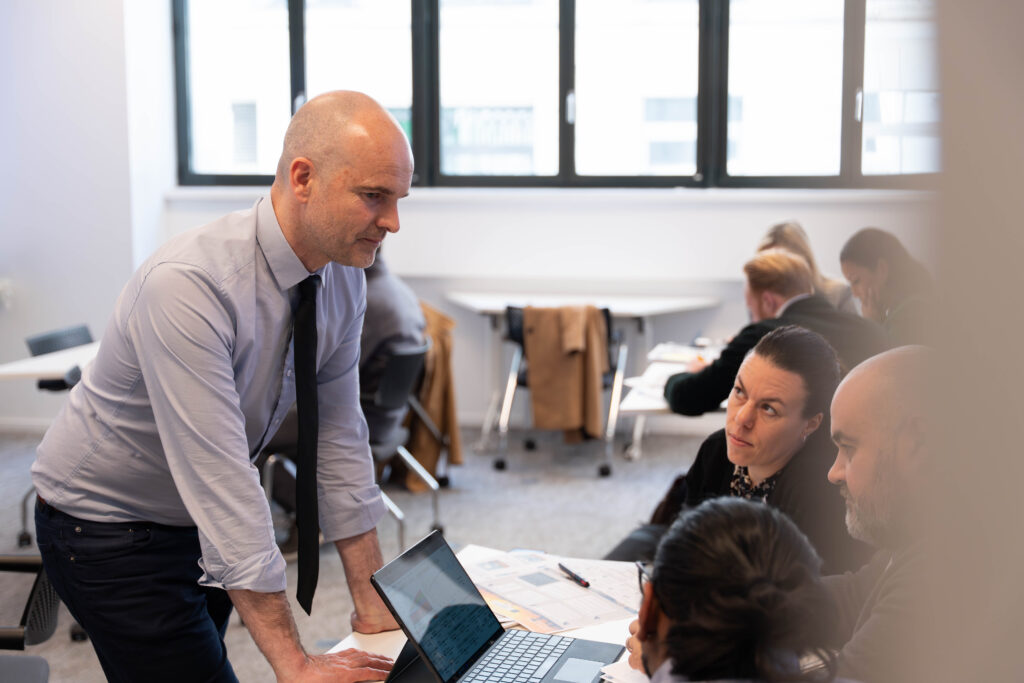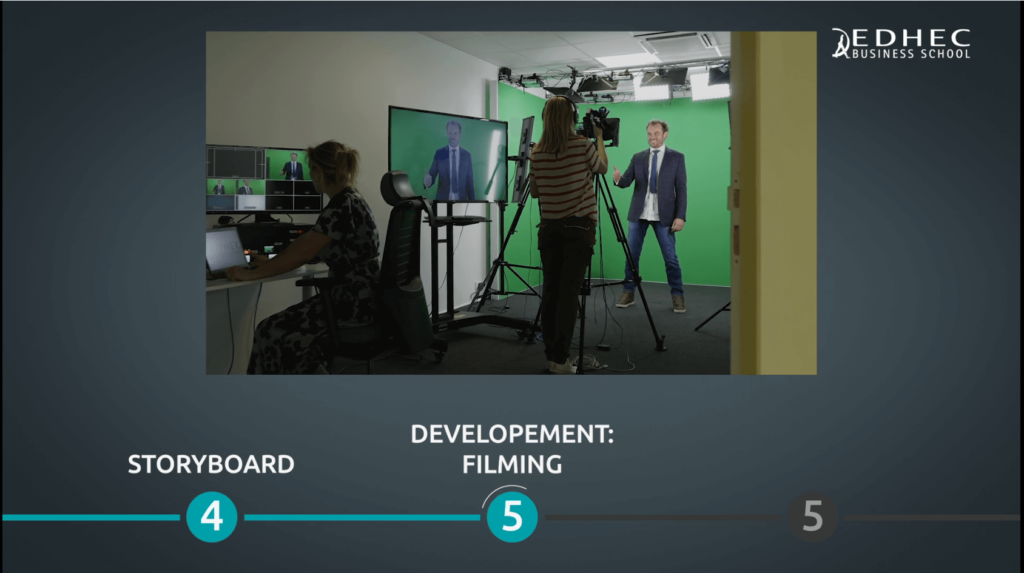In a constantly evolving global job market, upskilling is essential to stay relevant and future-ready. Acquiring new skills is important but putting them into practice is equally vital. Theory alone has its limits—when paired with hands-on experience, it becomes a powerful asset that can accelerate your career.
If you’re considering pursuing an online degree and feel concerned about missing out on practical experience due to the distance, EDHEC’s cutting-edge programs are designed to bridge that gap. Following a learning-by-doing approach, they ensure real-world learning that helps professionals gain in-depth knowledge and achieve their goals.
So, how is this hands-on learning brought to life in an online format? Read on to find out.
What Is the Learning by Doing Method?
Learning by doing is an educational approach that places practical experience and action at the centre of the learning journey. It’s based on the idea that individuals learn best when they are actively involved—through hands-on experience, experimentation, and reflection—rather than just absorbing information passively. This method often involves real-world projects, case studies, simulations, and interactive exercises that allow learners to apply theoretical concepts in meaningful ways.
What Are the Benefits of Learning by Doing?
Let’s take a simple example: imagine you attend a class on data visualisation. You learn what it is and explore the best tools for creating impactful charts and dashboards. But if you never actually try using those tools—never build a dashboard, run a data analysis, or work on a project—you’re only learning in theory. That knowledge remains abstract and easily forgotten.
Why Putting Theory into Practice Matters
When you apply what you’ve learned—by building a visualisation using real data or tackling a real business problem—you’re engaging in learning by doing. That’s when concepts truly start to stick. You gain confidence, identify gaps in your understanding, and strengthen your ability to apply knowledge in new contexts.
Practice is what transforms theory into skill. As the saying goes, practice makes perfect. It helps you discover what you’ve mastered and where you might need more support. More importantly, it builds your ability to think critically and solve problems in real-world situations.
Learning by doing transforms passive knowledge into real-world competence. Instead of simply knowing what to do, learners begin to understand how and why—which makes all the difference in professional environments. Here are some key benefits:
- Stronger Engagement: Actively participating in tasks keeps learners involved and curious, making the experience more dynamic and memorable than traditional methods.
- Deeper Understanding: Concepts become easier to grasp when explored through practical application—especially for complex topics that can seem abstract in theory.
- Better Retention: Applying knowledge reinforces it. Learners remember more when they’ve done the task, not just read about it.
- Confidence Building: Practising skills through projects and real-life scenarios helps build confidence and encourages learners to tackle challenges independently.
- Skill Development: Beyond academic knowledge, learners strengthen essential soft skills such as collaboration, communication, adaptability, and critical thinking.
- Problem-Solving Abilities: Facing real-world tasks requires learners to think critically, analyse situations, and make decisions—just like in the workplace.
- Relevance to Real Life: Learning becomes more meaningful when learners see how their knowledge connects directly to real-world contexts.
- Preparation for Career Success: This method mirrors the way professionals work—by doing, experimenting, iterating, and improving—so it helps learners get future-ready
Why Does It Matter in an Online Learning Environment?
One common concern about online education is the lack of face-to-face interaction or hands-on opportunities. But at EDHEC, this is addressed head-on. The school designs its online programs to follow a learning-by-doing approach—ensuring that students are not just passive learners, but active participants in their own development.

How Does Learning By Doing Work?
Learning by doing follows a cycle that encourages individuals to build knowledge through action, reflection, and application. Here’s how the process typically unfolds:
- Active Participation: Learners begin by engaging in a task—whether it’s a project, simulation, case study, or real-world challenge—that requires them to apply knowledge in context.
- Reflection: After completing the task, learners reflect on the experience. This step involves assessing what happened, identifying what went well or poorly, and thinking critically about the outcomes.
- Conceptual Understanding: Based on their reflections, learners make connections between their experience and underlying concepts or theories. This helps reinforce existing knowledge or develop new insights.
- Reapplication and Experimentation: Learners then apply what they’ve learned to new or more complex situations, refining their understanding and skills through trial and error.
- Ongoing Learning Cycle: Each round of experience and reflection feeds into the next, making learning by doing a continuous and evolving process.
This structured yet adaptable approach not only strengthens understanding but also builds the confidence and agility needed to face new challenges.
Tips for Effective Application
To make the most of a learning-by-doing approach, both learners and those designing the learning experience have an important role to play. Here’s how each can contribute to successful implementation:
For Learners
- Be Curious and Proactive: Embrace each task as a learning opportunity. Ask questions, seek feedback, and be open to trying new approaches.
- Reflect Often: After completing an activity, take time to think about what worked, what didn’t, and why. Reflection deepens understanding.
- Apply Theory in Context: Try to connect the practical task to what you’ve learned theoretically—this helps strengthen long-term retention.
- Embrace Mistakes as Part of Learning: Don’t be afraid to fail. Mistakes are often where the most valuable learning happens.
- Collaborate with Peers: Working with others can offer new perspectives and enhance your problem-solving and communication skills.
- Set Personal Goals: Know what you want to achieve in each activity. Defining your objectives keeps you focused and motivated.
- Stay Organised: Keep notes on your projects, outcomes, and lessons learned—you’ll build a personal toolkit of insights over time.
For Educators / Program Designers
- Define Clear Learning Objectives: Ensure each hands-on activity aligns with broader learning goals and outcomes.
- Design Relevant and Engaging Tasks: Activities should reflect real-world scenarios that resonate with learners’ interests and professional contexts.
- Integrate Seamlessly: Hands-on elements should support and enhance theoretical learning—not stand apart from it.
- Encourage Structured Reflection: Build in time and tools (e.g., journaling, group discussions) for learners to reflect on their experiences.
- Provide Support and Scaffolding: Offer guidance when needed, especially in complex tasks. Allow space for experimentation while maintaining structure.
- Foster Collaboration: Design tasks that require teamwork to build interpersonal skills and shared learning experiences.
- Allow for Autonomy: Give learners choices within the activity to develop ownership and decision-making abilities.
- Differentiate When Necessary: Adapt tasks and materials to accommodate various learning styles and levels.
- Connect to Real-World Applications: Show learners how the activity links to actual workplace or life scenarios for added motivation.
- Use Thoughtful Assessment: Evaluate both the process and the outcomes using methods like rubrics, peer feedback, or reflective portfolios.
- Stay Flexible: Be ready to adapt activities based on learner feedback or emerging needs.
- Celebrate Efforts and Achievements: Acknowledge milestones to keep learners motivated and confident.
Learning by Doing at EDHEC: Real-World Projects That Build Future-Ready Leaders
At EDHEC, experiential learning is more than a philosophy, it’s embedded into every program. Whether you’re pursuing an MSc or an MBA, you’ll engage in hands-on projects that bridge theory and practice, preparing you to lead in complex, fast-evolving environments.
Consulting Projects in Online Masters of Science Programs
A cornerstone of EDHEC’s Online MSc programs is the consulting project. Participants collaborate with real companies to tackle strategic challenges, applying their academic knowledge in a practical setting. This experience not only enhances problem-solving skills but also provides valuable industry exposure.
Beyond technical expertise, these projects help participants strengthen essential soft skills that are critical in demanding roles such as consulting. They learn to adapt to multicultural environments, work effectively in teams, and overcome personal barriers to succeed in collaborative settings. For Simon Mühlon an alumnus of the Online MSc in International Business Management program and a Strategy Consultant, these qualities have proven invaluable in his role:
“The program itself also requires a student to have a certain level of endurance and thrive in a multicultural workplace and environment. It involves connecting with each other and overcoming personal barriers and boundaries, stepping out of your comfort zone. I think these are the skills and overarching qualities necessary in consulting life, and EDHEC helps you work on them.”
By combining academic learning with real-world application, the consulting project equips students with the confidence, adaptability, and interpersonal skills required to succeed in complex and fast-paced professional environments.
Immersive Case Study in the MSc in International Business Management
In the MSc in International Business Management, participants take this hands-on approach even further with an immersive case study that spans an entire trimester.
Participants act as consultants for an innovative startup. Working in groups, they address a real strategic challenge and apply theory-based knowledge to areas such as sustainability, digital transformation, or artificial intelligence. Through data collection, analysis, and collaboration, they develop actionable recommendations for company stakeholders—gaining practical experience that mirrors the demands of global business environments.
MSC INTERNATIONAL BUSINESS MANAGEMENT
Entrepreneurship Project in the Online MBA
The Online MBA program includes a three-month Entrepreneurship Project, offering participants the opportunity to develop a comprehensive business plan. Guided by international innovation experts, participants choose between two tracks: Digital Entrepreneurship or Sustainable Entrepreneurship.
This project emphasises the practical application of entrepreneurial concepts, enabling participants to turn their ideas into viable business ventures while developing strategic thinking and leadership skills.
As Loick Menvielle, Online MBA Academic Director, explains:
“The Online MBA is a transformative journey designed around real-world challenges to go beyond the basics and learn how to think critically.”
Climate Change Simulation in the Online MBA Induction Seminar
As part of the Online MBA program induction seminar, participants take part in a climate change simulation using the En-ROADS simulator, developed by Climate Interactive and MIT Sloan. This interactive exercise challenges them to explore strategies for mitigating global warming while balancing political, economic, and social considerations. By working in teams, students enhance their negotiation, communication, and policy evaluation skills—gaining a deeper understanding of sustainable business decisions and their global impact.
These initiatives exemplify EDHEC’s commitment to a learning-by-doing approach, ensuring that graduates are not only knowledgeable but also equipped with the practical skills needed to thrive in a rapidly evolving world.

Action Learning in the Executive Master Management
The Executive Master Management program, eligible for CPF funding, emphasises hands-on learning through two collaborative group projects designed to encourage the exchange of best practices and experimentation with real-world cases.
- Sustainable Impact Project: With guidance from an EDHEC academic mentor, participants work in groups to design a service proposal for a company facing an environmental or societal challenge. This project not only addresses pressing sustainability issues but also develops managerial and strategic thinking as participants define the project scope and deliver actionable recommendations.
- Business Simulation: Conducted remotely via the Online Campus, this team-based project develops participants’ understanding of strategic and operational management in a competitive and constantly evolving environment. By working together, participants strengthen their decision-making abilities and learn to adapt to real-world business challenges.
Online Executive Master Management
Sustainable Impact Project in the Online Bachelor of Science
In the Bachelor of Science Online, the Sustainable Impact Project gives participants the opportunity to engage directly with sustainability challenges in a learning-focused format. Supported by an EDHEC academic mentor, they work in groups to propose a service solution for a company facing an environmental or societal issue, and define the project scope through a detailed brief.
Throughout the project, participants:
- Explore sustainability issues through concrete examples and case studies
- Engage in discussions with professors, professionals, and peers in a collaborative and innovative learning environment
Alexandre Cabirol, BSc Digital Marketing alumnus and Account Director at Yelloways, reflects on the value of this experience: : working on the Sustainable Impact Project throughout the year helped me build confidence, define objectives, and strengthen my ability to work effectively in a team on a long-term assignment. The final oral presentation required rigour and teamwork, both essential skills for my career. He also highlights the mentoring and coaching system as a major asset, offering valuable guidance and support throughout the project.
Immersive Learning in Online Certificates
EDHEC’s hands-on learning approach goes beyond its programs and is fully integrated into its certificates. These online certificates offer participants the opportunity to apply their knowledge in realistic scenarios, strengthen key skills, and drive impact in their professional environments.
Circular Economy Business Simulation in the CSR Strategy Certificate
The CSR Strategy Certificate, eligible for CPF funding, offers a highly practical learning experience through the Circular Economy module. Participants engage in an immersive business simulation designed to help them address the challenges of ecological transition. Working in teams, they manage a virtual company, analyse performance, and make strategic decisions in a collaborative setting.
This module helps participants:
- Adopt a new mindset to tackle the ecological transition
- Lead and optimise a company as a team, in a complex, evolving environment
- Strengthen teamwork and change management skills to drive sustainable impact
Agile Project Simulation in the AI & Digital Transformation Certificate
EDHEC’s practical approach also drives the learning experience in its AI & Digital Transformation Certificate, which is eligible for CPF funding. In the Agile Methods module, participants explore how to manage projects using agile frameworks and techniques, applying this knowledge directly in real-world-inspired scenarios. Through this hands-on approach, they learn to adapt quickly and foster innovation within teams.
This module helps participants:
- Understand the foundations of Agility, including its values, principles, and key frameworks
- Manage projects in Agile mode, enhancing responsiveness and flexibility
- Foster a culture of innovation and continuous improvement within their organisations
AI & Digital Transformation Certificate
Looking Ahead: The Future of Learning by Doing
As the professional landscape continues to evolve, learning by doing is set to play an even greater role in education. Employers increasingly value real-world experience, adaptability, and problem-solving skills—qualities best developed through practical learning. With the rise of online and hybrid formats, immersive projects, simulations, and collaborative challenges will continue to shape the future of education, making learning more impactful and career-focused than ever before.
Key trends shaping its future include:
- Virtual and Augmented Reality (VR/AR): Creating immersive, realistic environments where learners can simulate business decisions, negotiations, or operations.
- AI-Powered Personalisation: Adapting learning pathways to individual progress and preferences, offering tailored challenges and feedback.
- Gamification and Interactive Learning: Enhancing motivation and engagement through game-based elements, simulations, and interactive platforms.
- Global Collaborative Projects: Connecting learners worldwide to solve complex, real-world challenges, developing cross-cultural and digital collaboration skills.
- Sustainability and Social Impact: Integrating ethical reflection and responsible leadership into experiential learning activities.
- Skill-Based, Career-Oriented Learning: Aligning hands-on experiences with in-demand industry skills to better prepare learners for evolving job markets.
- Hybrid and Remote Learning Innovation: Making practical, group-based experiences accessible online, regardless of location or time zone.
- Inclusive and Accessible Education: Ensuring that learning-by-doing is available to all learners, through thoughtful design and adaptive tools.
- Ongoing Educator Development: Supporting instructors with training and tools to design meaningful, action-based learning experiences across digital platforms.
- Integration of Soft Skills Development: Experiential learning is increasingly focusing on developing soft skills such as leadership, communication, and adaptability, which are essential in the modern workforce.
These trends highlight how learning by doing will continue to shape impactful, forward-thinking education.
In short, learning by doing is not just a trend—it’s the future of education. It fosters agile, responsible, and innovative professionals ready to thrive in a fast-changing world.



